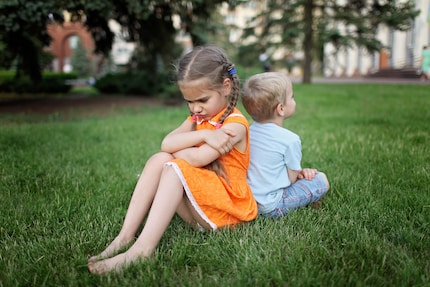
Background information
So much for sibling love
by Martin Rupf

Parents try hard not to favour a child, but most siblings still experience unfair differences. And they’re not wrong. But treating children the same doesn’t necessarily make things fair.
«All parents have a favourite child» – for a while, this headline kept popping up in my news feed. And sure enough, it didn’t take long before I clicked on it. That’s what a good headline does, after all (linked article in German). And this one really hit home. Why? Because it triggered questions in me: was I the favourite or the overlooked one? Do I treat my kids equally? Is this all even true?
The article claims that older siblings, conscientious children and girls are generally the favourites. At first, I was going to dismiss this as nonsense. But being the younger brother of a conscientious big sister and the father of kids in the same constellation, the statement got me thinking. The source was reputable and was picked up by an increasing number of media outlets. It doesn’t stem from a TikTok survey or a momfluencer on Instagram, but is based on a meta-analysis – the results of which were published in the prestigious Psychological Bulletin. In other words, the scientific truth from over 19,000 participants who took part in various studies about the relationships in their family. It’s definitely worth a read.
Headlines always make everything sound absolute, breaking down stories into black and white, pros and cons. And ending with a shocker. But real life is all about nuances. Small differences that add up. It’s about decisions parents regularly make without realising. Small acts that benefit one of the children – without any malicious ulterior motives. And without the children necessarily perceiving this as unfair. Parents are often under the impression that they favour and are emotionally closer to their daughters, whereas the kids usually feel they’re treated equally. In other words, while the parents are questioning themselves, the kids are happy. Good news, right?
The trouble is that most parents probably aren’t reflecting their behaviour on a daily basis, unless they’re taking part in a study. Not to mention behavioural patterns that inch their way into every family and are perceived as normal at some stage. Everyone has their role and, just like actors, need to be wary of being typecast at a young age and for all time. After all, these roles influence each other and can be either inspiring or paralysing.

Parents shouldn’t tell their offspring who or what they are, but show them everything they can be. What kids need for this is self-confidence. This includes occasionally testing boundaries, which can be tiring. However, the study did uncover one unhealthy trend: that «easy», reliable children are rewarded with more affection. Is that fair? Definitely not.
But it doesn’t surprise me, either. I’ve fallen into this trap, just like we all do from time to time. Why? Because everyone wants everyday life to be running smoothly. So a child who doesn’t play along is more likely to get into trouble. The more the parents are struggling, the more conflicts will arise and the more their affection will be compromised. Room tidy? Homework done? Got a good grade? Children will be praised for this, of course… After all, parents are happy when things go to plan. It makes them feel proud and boosts positive feelings – even if another family member’s suffering as a result.
When «uncomplicated» children are praised, this automatically puts unspoken pressure on the other siblings. The procrastinators drawing squiggles on a piece of paper instead of getting on with their homework. The ones who need to let off steam before finding their focus. Those who feel the weight of a busy schedule.
All of them will feel their mental backpack getting even heavier when they come home after a long day at school only to get the impression they’ve messed up or left something unchecked on their to-do list. This has consequences. According to the study, children who experience regular conflict with their parents are worse off later in life – both academically and mentally. The main problem being that the same is expected from each child. What would actually be fair, though, is to treat them differently.
Many situations would benefit from making fewer demands and, instead, understanding why the child’s mind isn’t ready for new tasks. This requires finding the patience to solve the problem in a different way, even if it means messing with your perfect routine. Children who feel understood also feel relieved and find it easier to cope. Kids who are allowed to be different are less explosive. It usually helps to stay calm, try and see things differently and to talk. Talk to each other. Together, not about each other.
Comparing your children is tempting but dangerous: «Just look how well your brother/sister is doing XYZ…» rolls off the tongue easily but should be ditched. Why? Because it can cause a lot of damage. Children are constantly comparing themselves already. At school. During sports. And at home with their siblings. Comparing children is particularly flawed if the age difference isn’t taken into consideration. And it’s very painful to hear things like «your brother could already do that at your age…», which is basically a verbal slap in the face. Children aren’t the same, so comparisons aren’t fair.
Naturally, siblings compete with each other and they all have trumps up their sleeve. The babies tend to play on your heart strings and usually experience quit a bit of leniency. Older children often bask in their superiority – and get frustrated when the little ones get everything they had to work hard for at an early age. Sweets, screen time, pocket money, you name it. This may seem unfair to the eldest child, and sometimes it is. But the situations aren’t the same. If anything, it’s usually the babies who are at a disadvantage, even though it doesn’t necessarily look that way at first glance.

According to scientists, these advantages shift under certain conditions. For example, when the older ones are given more freedom. This benefits them, as children develop better when they’re allowed to be more self-determined in their childhood and teenage years, while their parents focus on the younger siblings.
This is the statistical truth, which is reflected in trends. The main takeaway from this is to constantly question your own behaviour. Fortunately, raising kids isn’t a science, but a mix of love, intuition and convictions.
I find it challenging to be aware of everything and to handle life’s bigger and smaller moments appropriately. Is it fair to apply the same standard when a certain task is a piece of cake for one child but a huge effort for the other? Probably about as fair as placing the bar equally high for everyone in high jump. The trick is to ensure everyone feels seen and appreciated, challenged and encouraged.
The only way to do that is to spend time one-on-one. To talk, explain and occasionally say sorry for not treating everyone the same. And then giving a reason for it and trying to change things going forward. It’s probably also a good idea to point out some advantages that a child might have compared to their siblings. It’s the only way to increase mutual understanding and realisation that we all have different needs. At the end of the day, only one thing really needs to be the same: respect for other people and other opinions. Once the children have internalised this, the rest will be fine.
Simple writer and dad of two who likes to be on the move, wading through everyday family life. Juggling several balls, I'll occasionally drop one. It could be a ball, or a remark. Or both.
This is a subjective opinion of the editorial team. It doesn't necessarily reflect the position of the company.
Show all